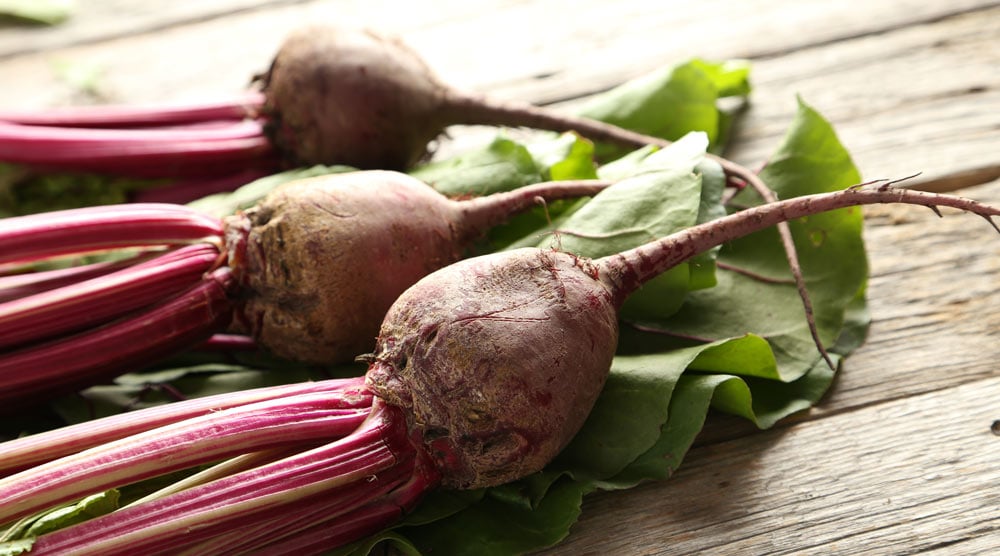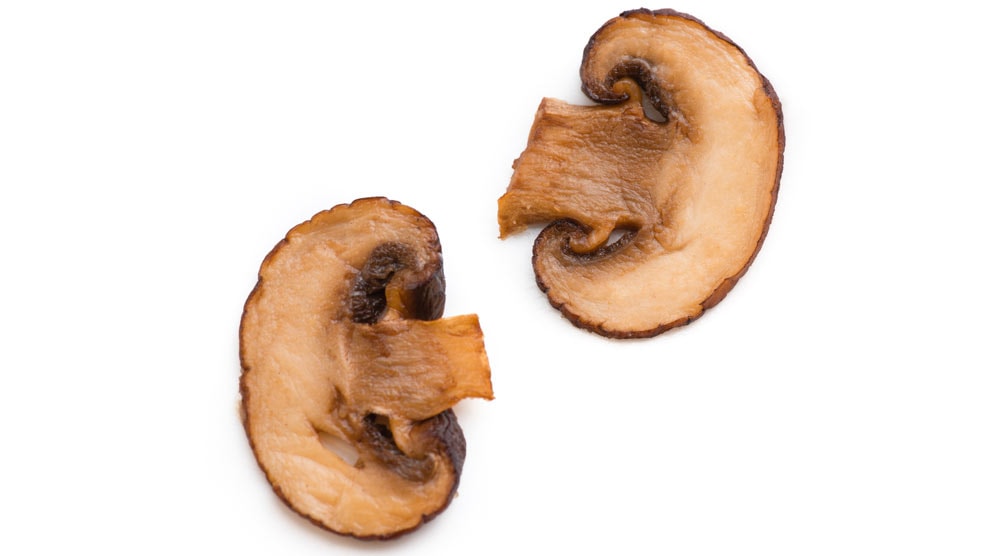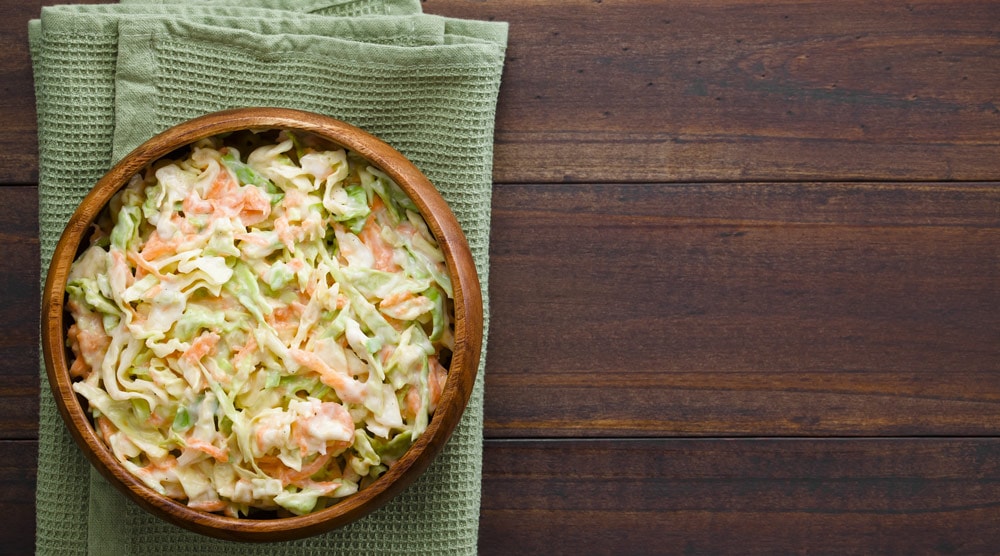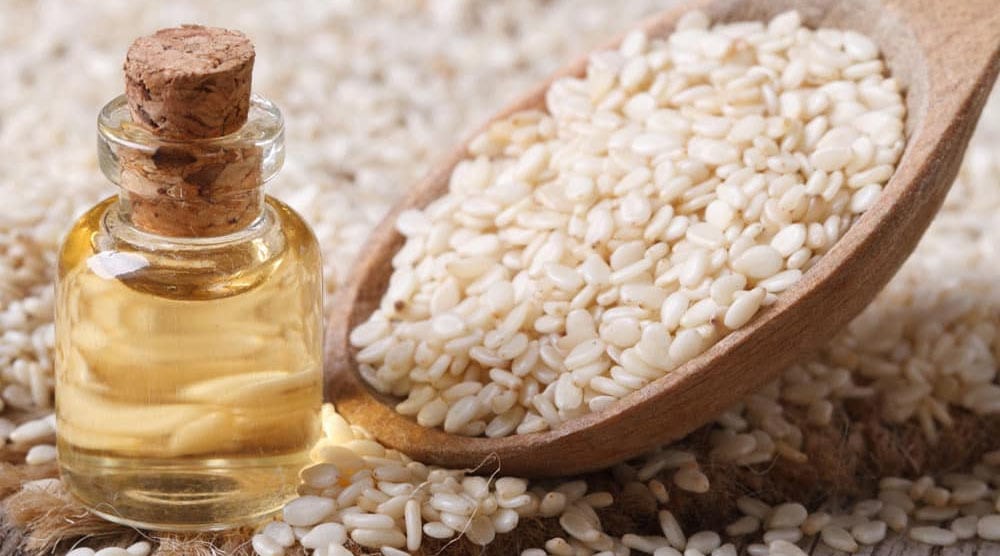Beetroot, commonly called beet, is a root vegetable containing plenty of nutrients. But can dogs eat beets? Or are they toxic to our canine friends? Read on to find out more.
Beets are non-toxic to dogs. So, you don’t need to worry if your dog accidentally eats a few.
However, beets are not an ideal dog treat. They could potentially increase the chance of a dog developing several health problems, including bladder stones, kidney stones, and urinary tract infections. Beets are also relatively high in sugar and can be a choking hazard.
In this article, we’ll discuss the dangers of dogs eating beets and whether they provide any health benefits. We’ll also list some other root vegetables that are not toxic to dogs,
Contents
Are Beets Toxic to Dogs?

Beets are non-toxic to dogs. They’re also a source of dietary fiber and packed with nutrients. You probably don’t need to worry about your pooch getting sick if they manage to snaffle a little from the counter, assuming they’re not allergic to beets.
That doesn’t mean beets should be fed to your dog regularly as a snack though. Listed below are some of the reasons why you might want to avoid giving your dog beets.
High in Oxalates
Beets contain a high quantity of the naturally occurring acid oxalate. This acid has been linked to certain health issues, so eating too many could lead to problems with urinary tract infections, or kidney and bladder stones.
Dogs already suffering from kidney stones certainly shouldn’t eat beets, as the oxalate content could make the problem worse. This is an example of why it’s important to discuss dietary changes with a vet.
“Calcium oxalates are probably the second most common type of bladder stone I see in my patients (struvites take the top place)”, says veterinary surgeon Dr Linda Simon. “We want to avoid making our dog’s urine acidic and should not feed large amounts of calcium, citrates or oxalates.”
May Turn Faeces Red
Eating beets can turn urine and faeces a rather alarming pink or red color. Often referred to as beeturia, this strange phenomenon usually isn’t something to worry about.
Studies in humans have shown that beeturia is more common in those suffering from an iron deficiency.
While there is uncertainty about whether this applies to dogs, it’s worth keeping an eye out for other symptoms and contacting a vet if you have concerns. Dogs with an iron deficiency may have less energy than normal, an accelerated heart rate, and experience a loss of appetite.
“Owners often mistake this red color for blood,” adds vet Dr Linda Simon. “However, if your dog is well, their stool is solid, and they’ve recently eaten lots of beets, then this is the more likely explanation for red or purple poop!”
High in Sugar
Compared to other vegetables, beets have a relatively high sugar content. Also, when cooked, the sugar content increases.
Too much sugar can cause problems with obesity, dental issues, and even lead to diabetes. If your dog has any of these conditions, you should discuss them with your vet before giving your pet beets.
Fortunately, beets are also rich in fibre. This slows the absorption of sugar into the system and prevents blood sugar spikes. For this reason, the sugar content of beets is considered less of an issue than eating the same amount of sugar from refined sources (such as biscuits.)
Even so, the sugar content of beets means they should only be given to dogs infrequently and in small quantities.
Note: Be aware that pickled beets usually have more sugar and also salt added, so they’re best avoided.
Can Be a Choking Hazard
Raw beets can be a choking hazard if eaten whole. Always chop them up before giving any to your dog. You could also mash beets for stuffing in a Kong or other food toy – although be careful to avoid giving too much.
Cooked beets are easier to digest and won’t present the same choking hazard. It’s best to stick to light cooking, however, to preserve as many of the nutritional benefits as possible.

What Other Root Vegetables Can Dogs Eat?
Root veggies, in general, are low in calories and tend to be a good source of fiber. They can often be high in sugars and starchy carbohydrates, though, so they might not always be the best vegetable choice for dogs on a diet.
Carrots are a great option as they have a lower carb and sugar content than other root vegetables. You could also let your dog try some radishes or parsnips.
Make sure you steer clear of onions and garlic, as both of these are toxic for dogs.
Certain non-toxic vegetables, such as sweet potato (along with legumes), have also been linked to a heart condition in dogs. However, this is only an unproven theory at the moment, so there isn’t a strong reason to avoid feeding dogs sweet potato at the moment.
Do Beets Provide Any Health Benefits to Dogs?
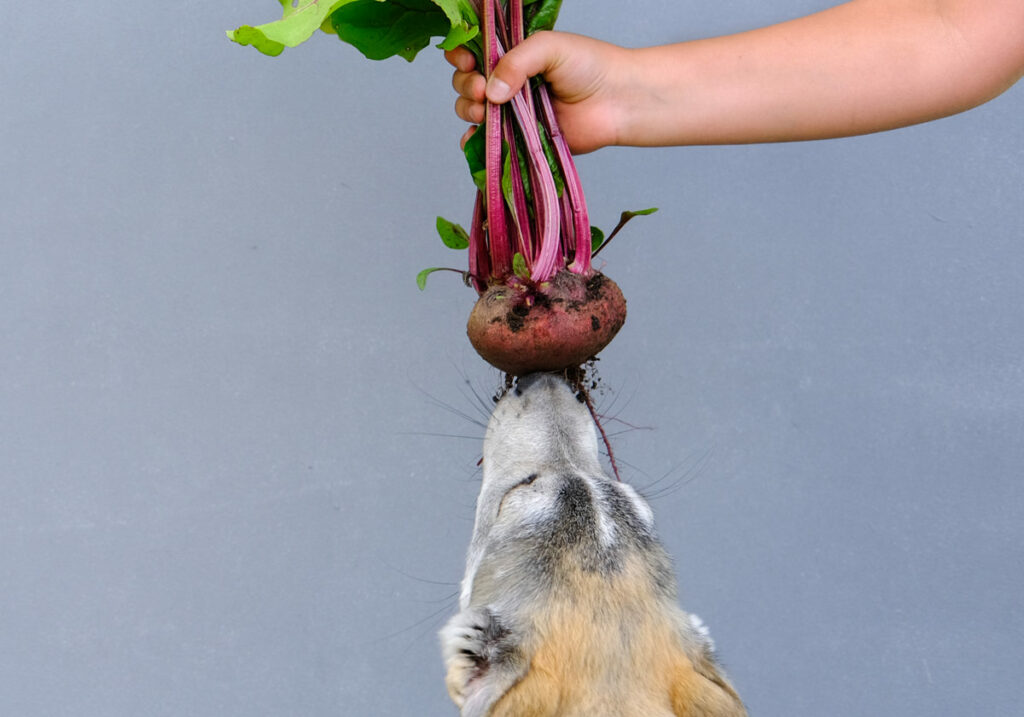
Dogs should eat a nutritionally complete dog food. They shouldn’t rely on treats or snacks for essential nutrition.
Even so, if you’re offering your dog beets in small quantities, there could be several nutritional benefits:
- High in fiber. A few slices of beets daily could help to improve your dog’s digestion and promote healthy bowel movements.
- Beneficial antioxidants. Beets are a good source of lutein which can boost a dog’s immune system. They also contain phytonutrients called betalains. These have been shown to have anti-inflammatory properties.
- Natural nitrates. In their naturally occurring form, nitrates have been shown to help lower blood pressure in humans. They could even help to lower blood sugar levels too.
- Good source of folate. This can be particularly beneficial for dogs that are suffering from chronic gastric conditions. Although it’s always best to speak to your vet before introducing any new foods for dogs with underlying health issues.
- Rich in manganese. The right amounts of this mineral can assist dogs with metabolizing carbs and proteins, and it can help to promote healthy bones and joints.
When introducing any new food to your dog’s diet, it should always be done gradually. Offering too much, too quickly can cause stomach upsets.
On the rare occasion that a dog has an allergy to beets, introducing a small amount will allow you to check for any allergic reaction. A flare-up can happen almost immediately, or it could take several days to manifest. You should look out for irritated skin, itching, or gastrointestinal problems. In severe cases, allergies could cause respiratory issues.
What About Pickled Beets?
It’s best to avoid giving your dog pickled or canned beets. They’re often soaked in a salty brine. While sodium is an essential nutrient for dogs, this should only be added in small quantities. Too much salt can cause dehydration and problems for dogs with kidney or heart disease.
Conclusion
Beets are non-toxic for dogs. As they are fiber-rich and packed with antioxidants, they could offer some nutritional benefits if fed in moderation as an occasional treat.
Because beets are high in oxalates, however, they shouldn’t be given to dogs suffering from kidney or bladder stones. You should also discuss them with a vet before giving them to your dog. Be aware they could turn your dog’s urine or faeces a rather shocking color!
Do you have any questions about whether dogs can eat beets? If so, please let us know in the comment section. You may also want to read our guide to whether dogs can eat radishes.
